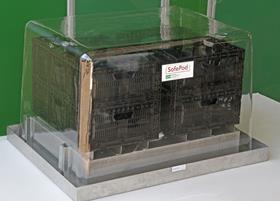
The world of crop storage isn’t the most glamorous in fresh produce, but it is without doubt one of the most important. Without high-quality facilities and equipment to store product, all that hard work in growing the most perfect, delicious fresh produce would all be for nothing.
The need for just-in-time deliveries, the freshest produce and optimal conditions, as well as the challenges of production, are giving packers much to think about. According to John Dye, managing director of JD Cooling, the biggest change is a reaction to global warming and the realisation that the warmer, wetter winters could be here to stay.
“As a result we are seeing a major growth in enquiries for mechanical cooling to stores which were previously reliant on ambient cooling only and which have therefore been unable to store produce this year,” he explains. “These stores are mainly for potatoes, but we have also seen a reaction on the carrot and brassica side of the market, which have both been struggling with the weather changes.”
Liam Redmond, director of Cornerstone Systems, agrees that environmental concerns are playing a big part in what growers are asking manufacturers for at present. “We see a big trend in potato storage toward renewable energy usage, particularly PV. Some of our larger customers have been installing PV arrays on potato stores to power refrigeration and ventilation equipment in order to reduce energy costs,” he says.
Certainly, the potato sector faces a number of particular challenges. Adrian Cunnington, head of Sutton Bridge Crop Storage Research, reports that finding ways to prevent disease in potato storage is a major focus of his facility’s efforts at present.
“Crops currently in store are probably holding up reasonably well, but there are pockets of problems with rots,” he explains. “So some people are unloading earlier than anticipated in certain areas of the country. We are going to focus on storage problems and storage disease management.”
On field veg, Dye points out that while storage of carrots in the field is still the most common method used by growers, wetter and warmer weather is making this approach less viable. “Developments in varieties of carrots that store well in refrigerated stores, coupled with improved understanding of the best way to grow and harvest the crop into cold storage, has seen better and better results from those who currently use this method of storage alongside traditional field storage,” he adds.
“Not only is the taste of cold-stored carrots much better than with field-stored crop, the use of cold storage allows growers with these facilities to supply their end users regardless of the weather – a major plus point when such wet conditions have made it almost impossible to get harvesting machinery into the field.”
As technology races to keep up with the changing environment, manufacturers will be at full tilt to ensure they have the technology in place to ensure the UK stays at the forefront of storage innovation.
Dynamic CA storage
A major three-year research project will optimise ‘dynamic controlled atmosphere’ storage capability for UK growers and packers, potentially opening up availability of home-grown produce to buyers for longer windows of time.
A supported trial of the new technology, named SafePod, has the potential to extend the storage life of fresh produce beyond traditional controlled atmosphere capabilities and is being developed by International Controlled Atmosphere (ICA) with US partner Storage Control Systems. Two independent research projects, co-funded by the UK’s innovation agency, Innovate UK, are underway to determine the optimum storage conditions of both top fruit and asparagus.
As its name suggests, the system is a type of “pod” that surreptitiously sits inside growers’ controlled atmosphere storage rooms. David Bishop, technical director of ICA, explains that the core aim is to determine how best this technology can be used for the benefit of the fresh produce industry.
Tackling rot in potato stores
Sutton Bridge Crop Storage Research has recently published two new reports, on Blackheart and ethylene use for processing.
Blackheart is a physiological disorder resulting in necrosis and cavitation of central tissues of potatoes, and is a particular problem in stored product.
With current quality control procedures failing to adequately pick up the defect, some 25-30 per cent of consumer complaints are believed to be as a result of the problem.
The report, which is available on AHDB’s website, advocates the adoption of a more aggressive risk assessment methodology to enable high-risk stocks to be more readily identified and Blackheart risk to be more actively managed.



